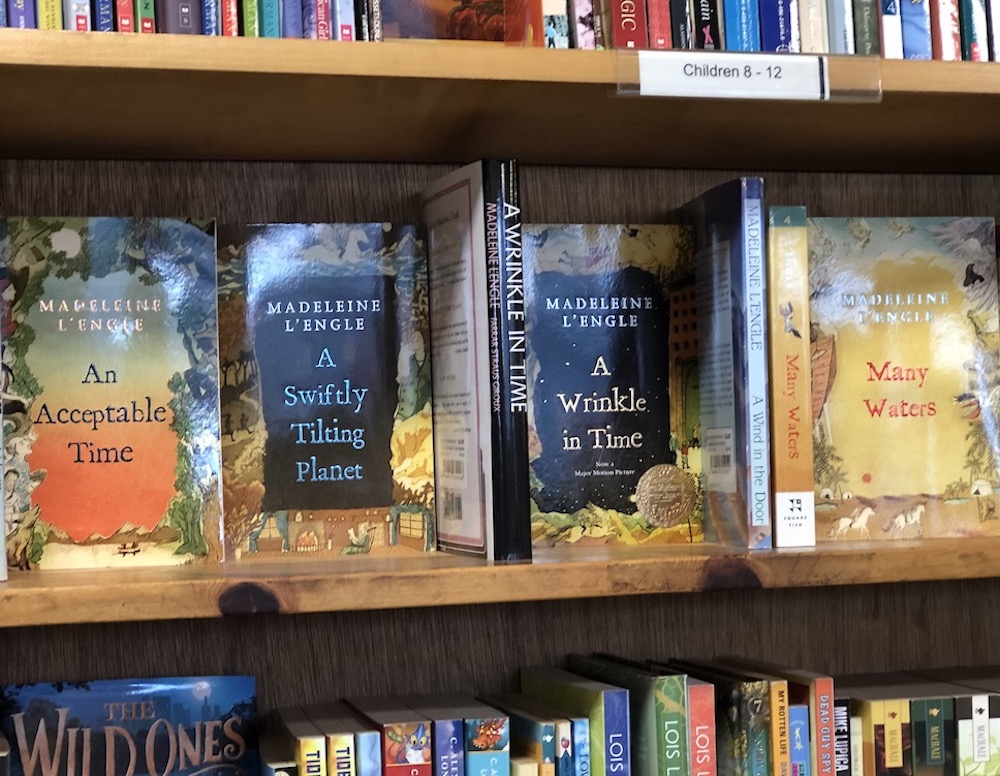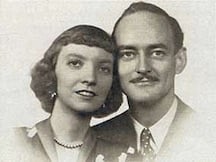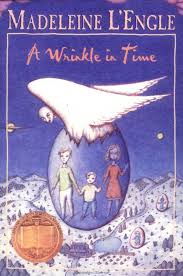Quotes by Madeleine L’Engle on the Writing Life
By Emma Ward | On June 23, 2017 | Updated October 18, 2022 | Comments (0)

Madeleine L’Engle (1918 – 2007) was an author of fantasy fiction for children and young adults, best known for A Wrinkle in Time and the series of books that followed. She had trouble finding a publisher for what became her most famous book; editors were concerned that it was “too dark for children.”
Her career began after graduating college when she wrote plays that were published followed by her books and honorary degrees.
L’Engle wrote much about her life as a writer, and as a working mother. She mused on the challenges of the writing life and juggling her career with the raising of her children. Here is a selection of quotes by Madeleine L’Engle that speak to her thoughtfulness and honesty.
. . . . . . . . . .
“You have to write the book that wants to be written. And if the book will be too difficult for grown-ups, then you write it for children.”
. . . . . . . . . .
“A book, too, can be a star, a living fire to lighten the darkness, leading out into the expanding universe.”
. . . . . . . . . .
“I have a friend, a beautiful and talented young woman, who is afraid to have a child and who is afraid to use her talent to write. She does not yet understand the joy that follows the pain of birth. I’ve experienced the pain and joy of the birth of babies and the birth of books and there’s nothing like it: when a child who has been conceived in love is born to a man and woman, the joy that birth sings throughout the universe.” (A Circle of Quiet, 1972)
. . . . . . . . . .

For someone who faced so much rejection when trying to get published,
Madeleine L’Engle’s books have had incredible staying power
. . . . . . . . . .
“I had to learn that I was a better mother and wife when I was working than when I was not.” (Walking on Water, 1980)
. . . . . . . . . .
“Many people in walks of life which do not involve creation are completely unaware of the necessity for discipline. It is not only that few serious artists who live lives of debauchery produce a large body of work but that few serious artists are able to live lives which are without interruption.” (Walking on Water, 1980)
. . . . . . . . . .
“Our truest response to the irrationality of the world is to paint or sing or write, for only in such response do we find truth.”
. . . . . . . . . .

Photo by Anna Fiore
. . . . . . . . . .
“To work on a book is for me very much the same thing as to pray. Both involve discipline. Inspiration far more often comes during the work than before it, because the largest part of the job of the artist is to listen to the work and to go where it tells [her] to go. Ultimately, when you are writing, you stop thinking and write what you hear.” (Walking on Water, 1980)
. . . . . . . . . .
“If a writer says [she] doesn’t care whether [she] is published or not, I don’t believe [her]. I care. Undoubtedly I care too much. But we do not write for ourselves alone. I write about what concerns me, and I want to share my concerns. I want what I write to be read. Every rejection slip — and you could paper walls with my rejection slips — was like the rejection of me, myself, and certainly of my amour-propre.” (A Circle of Quiet, 1972)
. . . . . . . . . .
“Ultimately, you have to sit down and start to write. And even if all you do is type out “I can’t write this morning; I can’t write this morning; oh, bother, I can’t write this morning,” that will sometimes prime the pump and get it started.” (Madeleine L’Engle Herself, 2001)
. . . . . . . . . .
Learn more about Madeleine L’Engle
. . . . . . . . . .
“To write consistently, I must seize opportunities. I write in airports. I write on planes. I find airports and planes and hotels excellent places in which to write because once I am in them I am not responsible for anything except my work…I am free to write.” (Walking on Water, 1980)
. . . . . . . . . .
“When I start working on a book, which is usually years and several books before I start to write it, I am somewhat like a French peasant cook.There are several pots on the back of the stove, and as I go by during the day’s work, I drop a carrot in one, an onion in another, a chunk of meat in another…
When it is time to start work, I look at everything in the pot, sort, arrange, think about character and story line. Most of this part of the work is done consciously, but then there comes a moment of unselfconsciousness, of letting go and serving the work.” (Walking on Water, 1980)
. . . . . . . . . .

. . . . . . . . . .
“The writer whose words are going to be read by children has a heavy responsibility. And yet, despite the undeniable fact that the children’s minds are tender, they are also far more tough than many people realize, and they have an openness and an ability to grapple with difficult concepts which many adults have lost. Writers of children’s literature are set apart by their willingness to confront difficult questions.” (Dare to be Creative! 1983)
. . . . . . . . . .
“Now there are mornings when I joyfully sit down at the typewriter. But there are mornings when it is anything but a joy. There are evenings when I go to the piano and the music comes pouring from my fingers. There are evenings when I’m all thumbs and I have to make myself sit there and go over scales and finger exercises before I can play anything. The same thing is true with writing.” (Madeleine L’Engle Herself, 2001)
. . . . . . . . . .
“Risk is essential. It’s scary. Every time I sit down and start the first page of a novel I am risking failure. We are encouraged in this world not to fail…I think that is a bad thing that the world has done to us…We are encouraged only to do that which we can be successful in. But things are accomplished only by our risk of failure. Writers will never do anything beyond the first thing unless they risk growing.” (Madeleine L’Engle Herself, 2001)
. . . . . . . . . .
“When we write and are published, we become naked before people…it’s hard for us to open ourselves to rebuff…Every other writer I know, when you get ninety-nine good reviews and one bad review , what review stays in your mind? The bad one. And why? Because it awakens our own doubts.” (Madeleine L’Engle Herself, 2001)
. . . . . . . . . .
“The primary needs can be filled without language. We can eat, sleep, make love, build a home, bear children, without language. But we cannot ask questions. We cannot ask, “Who am I? Who are you? Why?” (A Circle of Quiet, 1972)
. . . . . . . . . .
Have you read A Wrinkle in Time?


Leave a Reply